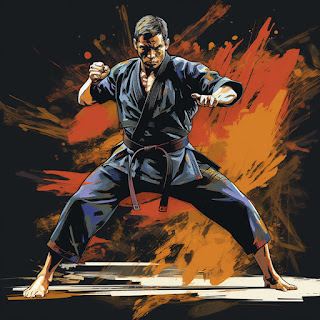The Role of Teamwork in Teen Karate Practice
Karate: A Path to Personal Growth and Connection for Teens
In an era where digital interactions often dominate teenage social lives, traditional martial arts like karate are emerging as powerful tools for personal development and peer connection. Recent studies and observations from karate instructors highlight the multifaceted benefits of this ancient practice for adolescents aged 13-17.
Karate, known for its emphasis on self-discipline and physical fitness, offers more than just self-defense skills. It provides a unique platform for teenagers to build self-confidence, improve their physical health, and develop crucial life skills. The structured environment of a karate dojo (training hall) creates a safe space for adolescents to challenge themselves and grow both individually and as part of a community.
One of the most significant advantages of karate training for teens is its inherent inclusivity. Dojos often bring together young people from diverse backgrounds, fostering an environment where differences are celebrated and mutual respect is paramount. This inclusivity helps break down social barriers and promotes understanding among peers who might not otherwise interact in their daily lives.
The partner drills and sparring sessions that are integral to karate practice play a crucial role in building trust and mutual support among participants. These exercises require students to work closely with one another, developing a sense of reliance and cooperation that extends beyond the dojo walls. Through these interactions, teens learn the importance of teamwork and develop strong bonds with their training partners.
Communication skills, both verbal and non-verbal, are significantly enhanced through karate training. Students must learn to articulate their needs, provide feedback to partners, and interpret body language during sparring sessions. These skills are invaluable in all aspects of life, from personal relationships to future professional endeavors.
The shared goals inherent in karate practice, such as belt advancement and team demonstrations, create a strong sense of community and motivation among teenage practitioners. Working towards common objectives fosters a supportive environment where peers encourage each other's progress and celebrate collective achievements. This sense of belonging is particularly crucial during the often tumultuous teenage years.
Leadership qualities, resilience, and adaptability are naturally cultivated through karate training. As students progress, they are often given opportunities to lead warm-ups, assist in teaching younger students, or demonstrate techniques. These experiences help teens develop confidence in their abilities and learn to adapt to various situations and personalities.
Peer learning is a fundamental aspect of karate practice. Students are encouraged to learn from each other's strengths and weaknesses, providing constructive feedback and support. This collaborative learning environment helps teens develop empathy, patience, and the ability to both give and receive criticism constructively.
The mental discipline required in karate practice extends far beyond the dojo, equipping teens with valuable tools to face life's challenges. The focus and concentration developed through kata (formal exercises) and meditation practices can help improve academic performance and emotional regulation.
As students advance in their karate journey, many find opportunities for mentorship and leadership roles. Senior students often guide and inspire younger ones, fostering a sense of responsibility and purpose. This mentorship dynamic creates a positive cycle of support and growth within the karate community.
The collective celebration of achievements, such as belt promotions or tournament successes, reinforces the sense of community within the dojo. These shared moments of pride and accomplishment create lasting memories and strengthen the bonds between students.
While the physical benefits of karate are well-documented, it is clear that the practice offers much more to teenage practitioners. The combination of personal growth, peer connection, and community building makes karate a valuable activity for adolescents navigating the complex journey to adulthood.
As society continues to grapple with issues of teenage isolation and mental health, traditional practices like karate offer a time-tested approach to fostering well-rounded, confident, and connected young adults. Parents and educators would do well to consider the profound impact that martial arts training can have on teenage development and social integration.



Comments
Post a Comment